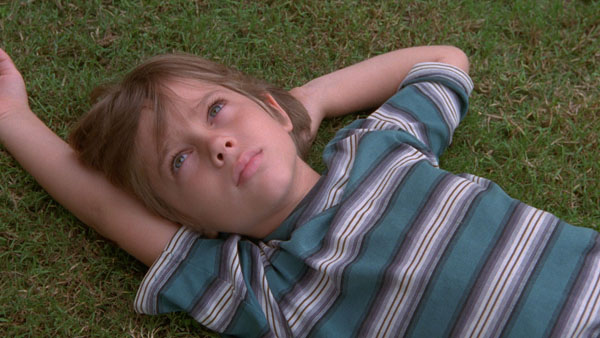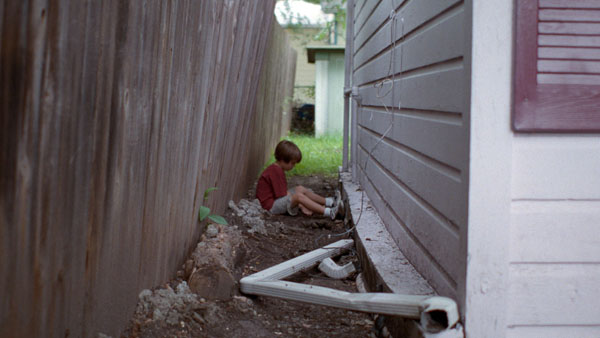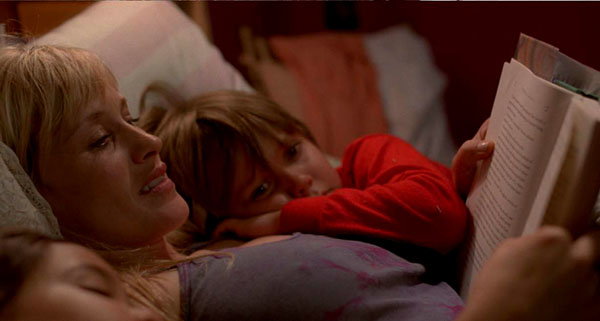“Over the course of his filmmaking career,” begins the Boston Globe‘s Ty Burr, “Richard Linklater has played, at times obsessively, with what might be called durational realism, starting with the epic monologues of Slacker, capturing in amber the last week of high school (Dazed and Confused), and blossoming with the 18-year sectional life drama that is the Before Sunrise/Sunset/Midnight/xxxx series. No other director I can think of is so intrigued by the notion of exploring life as it’s lived by expanding the cinema’s palette of time.” Boyhood is “a project that, in essence, connects the dots of a trilogy like the Before films. Starting in 2001 and shot intermittently over 12 years, Boyhood follows a young boy named Mason Evans, Jr., played by Ellar Coltrane, as he ages from 6 to 18—from childhood to the edge of adulthood…. Boyhood is a reminder of what it is to be a young person expanding your soul unseen by all the adult control freaks who only want the best for you, even as they have no idea who you actually are.”
For Indiewire‘s Eric Kohn, the “key to Boyhood lies with the smallness of its story, which revolves around the plight of Texan native Mason (Ellar Coltrane) along with his older sister Samantha (Lorelei Linklater, the director’s daughter) and their divorced parents, Mason Sr. and Olivia (Ethan Hawke and Patricia Arquette). As we watch this quartet consistently age during the movie’s justifiable 164 minute length, the subtle qualities of change become steadily crystallized. At its center, Mason’s growth allows Coltrane to fully inhabit his character through the accumulation of his experiences and their recurring impact on his expanding awareness.”
Mason’s “is the most radical, unnerving transmogrification, though it’s a film of several,” observes Guy Lodge at In Contention. “The title, indeed, is a bit of a misnomer, unequal to the project’s generous, wildly expansive scope: Mason’s boyhood is but one arc in a film that observes how adults and children alike are forced to build and rebuild lives, personalities, families and homes, subtly redefining themselves as often as they more visibly change address, relationship status or hairdo. Now that Boyhood is with us, it seems positively bizarre that Linklater—whose work rate has been more or less consistent over the years, even if the work itself has not—could have kept it stewing so steadily on the back burner all this time as he busied himself with the lesser concerns of The Bad News Bears or Me and Orson Welles. How does work on this scale not consume its creator? Yet it’s the casual ease of Boyhood’s construction, its lack of a specifically lofty artistic objective, that make it so effective.”
For EW‘s Owen Gleiberman, Linklater “is a storyteller who reveres the art of naturalism, and Boyhood, though it’s a genuine movie, full of bustlingly staged scenes and performances and motifs and arcs, has the feel of a staged documentary about a fictional character. It’s lively and boisterous and mostly very entertaining to watch, because stuff keeps happening, but the film also rolls forward in an almost Zen manner, so that everything that occurs—an angry family dinner, a camping trip, a haircut, an afternoon of videogames—carries the same wide-eyed, you are here significance. The film has that deadpan Linklater tone of slacker haphazardness, but you could also say that it’s almost Joycean in its appreciation of the scruffy magic of everyday life.”
And for the Wall Street Journal‘s Ben Fritz, “Boyhood suggests that the long arc of life can be perhaps better understood as a series of moments rather than an uninterrupted flow.”
You’ll remember that terrific video essay Linklater // On Cinema & Time that kogonada created for Sight & Sound. An interview with the filmmaker’s a crucial part of it, and “remnants” of that conversation have just been posted.
In Contention‘s Kristopher Tapley interviews Hawke.
Updates: “Like so many of Linklater’s projects, Boyhood will no doubt ripen with age,” suggests Variety‘s Peter Debruge. “Certainly, there’s an enormous difference between the film as it is experienced at the moment of projection and the one that settles in the days and months to follow. Nearly all the helmer’s pics so thoroughly reflect the moment of their creation that it would be fascinating to screen the film alongside a retrospective of the other work he’s created over the past 12 years…. There’s a rough-edged, organic quality to Boyhood that resembles those European helmers Linklater so admires: Fassbinder, Bergman, Bresson. On one hand, both the casting and decision to shoot on 35mm (right up to the format’s demise) give the project a uniformity of appearance, and yet, even though he claims to have decided on the last shot two years into the project, nothing feels predetermined.”
“Linklater avoids any obvious signposts to show their evolution,” notes Anthony Kaufman in Screen Daily. “Rather, he smoothly cuts across the decade, using changes in hairstyle, popular songs, cultural touchstones (Harry Potter, the Iraq War) and technological developments—from PlayStation to Wii, iPods to iPhones—to mark the march of time…. Undoubtedly, the best scenes in the film involve Hawke’s high-energy performance as their father, a slacker musician who rails against George Bush, takes his kids to a Houston Astros baseball game, and—in one great bit—enthusiastically sings the praises of The Beatles’ bootleg Black Album. There are also some genuinely touching little moments between father and son, whether discussing the existence of elves or visiting a swimming hole. Every time he appears on screen, Hawke enlivens the proceedings, and watching his own character evolve from deadbeat Dad to a newly responsible family-man is one of the fringe joys of the film.”
“Boyhood could’ve perhaps used some bigger moments to really emotionally hook the viewer,” suggests Rodrigo Perez at the Playlist, “but then that would be going against its raison d’être. Linklater isn’t interested in big swelling, dramatic moments but instead finds an overall snowballing sinew in the overlooked corners…. The whole is indeed greater than the sum of its parts.”
For BlackBook, Jason Guerrasio has notes from the post-screening Q&A.
It’s “a film that can be plain on a moment-to-moment basis but is something quite special in its entirety,” writes the Hollywood Reporter‘s Todd McCarthy. And “there is little doubt that, over time, Boyhood will be seen and deeply appreciated by viewers young and old on various formats and in different ways, with the end result that it will endure.”
Nathaniel Rogers: “Individual moments sing and amuse and bore and threaten and meander… but oh how its cumulative effect grows. It packs the gentlest of punches but you’ll be floored.”
Vulture‘s Kyle Buchanan has more from the Q&A: “So would Linklater ever pick up Mason down the line for a sequel, in much the same way he’s followed Celine and Jesse through the years-apart follow-ups to Before Sunrise? ‘We’ve never even talked about that,’ confessed Linklater. He turned to Coltrane and sized him up, immediately pitching the sequel: ‘We’ll pick him up as a young parent.’ And time goes on and on.” More from EW‘s Jeff Labrecque.
Updates, 1/21: Boyhood “isn’t quite like anything else in the history of cinema,” writes Salon‘s Andrew O’Hehir. It’s “a chronicle of joy and tragedy and loss and time that’s at least as profound as The Tree of Life and a whole lot easier to understand.”
The Dissolve‘s Noel Murray is “surprised and even pretty delighted to see a movie so ostensibly ambitious also be so stubbornly, meaningfully shapeless…. Ordinarily, I hesitate to give an uneven movie credit because ‘Hey, life is uneven’—and so I’m not fully excusing the scenes and performances in Boyhood that fall flat. But at the same time, part of this big experiment of Linklater’s is to document his own development as a filmmaker, which is why it shouldn’t be surprising the the film gets more assured as it goes along.”
“A lot happens in the film, but not all of it seems to be serving a larger vision,” writes the AV Club‘s A.A. Dowd. “Then again, cohesiveness isn’t everything, especially in a movie attempting to make sense of the long journey from salad days to rites of passage. Ultimately, Boyhood’s methodology is so powerful, and powerfully interesting, that its flaws scarcely matter.”
James Rocchi at Cinephiled: “As singular as it is extraordinary, a work that speaks to all of its creator’s concerns and requires all of his craft yet also expands on both. Boyhood may seem ambling and shambling and natural, but by the end of it, you realize that it’s a rare, special and significant case of art truly imitating life.”
“What an astonishing achievement; what a beautiful movie.” The Guardian‘s Xan Brooks: “It’s lovingly assembled and acted with such grace and ease that it scarcely looks like acting at all. Midway through the film, I found myself wondering whether I’d ever seen anything remotely resembling it before. Except that of course I have; we all have. Simply look at your own family; it’s happening all over.”
Ben Umstead at Twitch: “To consider Boyhood is to consider a 21st century America: its politics, its culture, its wars and technology. As a document of a generation of children, and a generation of parents, it is perhaps more complete, alive and important than any other American film by an established director in the last 20 years. It’s clarity of vision is remarkable for all its extraordinary parts coming together so beautifully.”
At Flavorwire, Jason Bailey has more from the Q&A.
Updates, 1/30: “It was a blast from the indie past to watch Richard Linklater soak in the applause of the Sundance Film Festival audience on Sunday,” writes Manohla Dargis in the New York Times. “In a sense, Mason’s on-screen evolution mirrors that of Mr. Linklater, another child of Texas who has grown up in front of moviegoers, becoming along the way an exemplar of American independent cinema. He has had more than a handful films at Sundance—it originally rejected Slacker—which has helped burnish his reputation as a quintessential independent despite his on-and-off adventures with the big studios. The kind of artistic trajectory he’s enjoyed, Mr. Linklater said after the Boyhood premiere, is hard to imagine these days given how rapidly movies slip in and out of theaters before moving to on-demand.”
Locarno artistic director Carlo Chatrian: “If, as Cartier-Bresson theorized, the art of photography consists of managing to capture a moment for eternity, film has a contrary tendency: to reproduce the flux of life, in its most glorious moments—which so often pass unobserved—along with those that are its most banal. Richard Linklater has pursued this interest in working with, and over, time for several years now… Drawing on approaches derived from serial narration and adapting them cinematically, Linklater has found a way to give unprecedented depth to his characters. A third dimension that does not originate in technique but is the outcome of a more diverse and more complex relationship between the time in life and narrative time. In this sense Boyhood is a unique and literally unrepeatable project.”
2½ hours “still leaves you wanting more,” writes David Fear for Esquire. “It’s impossible not to bring your own experiences of growing up into it as well: those small moments and big dreams that marked you as you put away childish things once upon a time. Linklater has designed Boyhood to push those buttons even as he tells Mason’s story. He’s also made what could be his greatest achievement to date.”
For Sam Adams, writing in the Philadelphia City Paper, “it’s not surprising that the quality of Boyhood varies wildly; imagine the director of Before Midnight collaborating with the director of Fast Food Nation. But its best years are its last, in no small part because Coltrane grew during filming from a cute kid to a captivating young actor.”
“This movie might make you cry for reasons you can’t quite articulate,” warns Tim Grierson at Paste. “You won’t be alone in feeling that way…. Linklater doesn’t force an agenda or a perspective on the material, but Boyhood is rife with ideas and philosophies. A longtime chronicler of his home state of Texas, Linklater may have inadvertently delivered his definitive portrait of the state, breezily capturing its complexity and contradictions. It’s a land populated by the deeply religious and the wildly liberal, the two groups sometimes awkwardly coexisting, even in Mason’s family. Rather than mocking his characters’ differences, Linklater embraces them. It’s a testament to his artistry that we do, too.”
“Is Boyhood the most nuanced home movie of all time?” asks Time Out‘s Joshua Rothkopf. “Not quite, and that would diminish Linklater’s achievement. Better to say that it retrains us to let go of melodramatic expectations and simply let life unfold, a remarkably sophisticated ambition.”
“The most singular image of the film comes when a pre-teen Mason is asked to paint over the growth marks in a doorway as Mom packs up their things,” finds William Goss at Film.com. “Just because the lines and dates are gone doesn’t mean that he and his sister will somehow stop growing, and much of what follows comes from a place of wisdom and perspective almost entirely unseen in American cinema (if anything, this project merits comparison to the likes of everyday epics Yi Yi and The Best of Youth).”
“Boyhood is a portrait of so many dynamics,” writes Alexandra Marvar at Cinespect. “Sibling relationships, divorcee relationships, father-son relationships, child-parent relationships. It’s a reminder of all the unpleasant and unappealing places children are dragged to in their youth, because they are too young to have other options—both literally and figuratively. It’s a narrative chart of the way our confidence as children is handed off from person to person—from mom to mom’s boyfriend to absentee father to mom’s next boyfriend and the one after that, from teacher to teacher, influencer to influencer, until we become our own people, with all our flaws and traits as souvenirs from the relationships in our most impressionable years.”
Boyhood “is at times arresting and aggravatingly uninteresting,” finds Nicholas Bell at Ioncinema. “And just as we watch its engaging cast members grow before our eyes, so do we see Linklater’s own craft as a director and screenwriter transform as well.”
Viewing. Linklater, Hawke, Arquette and Ellar Coltrane talk to EW (3’45”) and Variety (2’08”).
For news and tips throughout the day every day, follow @KeyframeDaily on Twitter and/or the RSS feed. Get Keyframe Daily in your inbox by signing in at fandor.com/daily.






